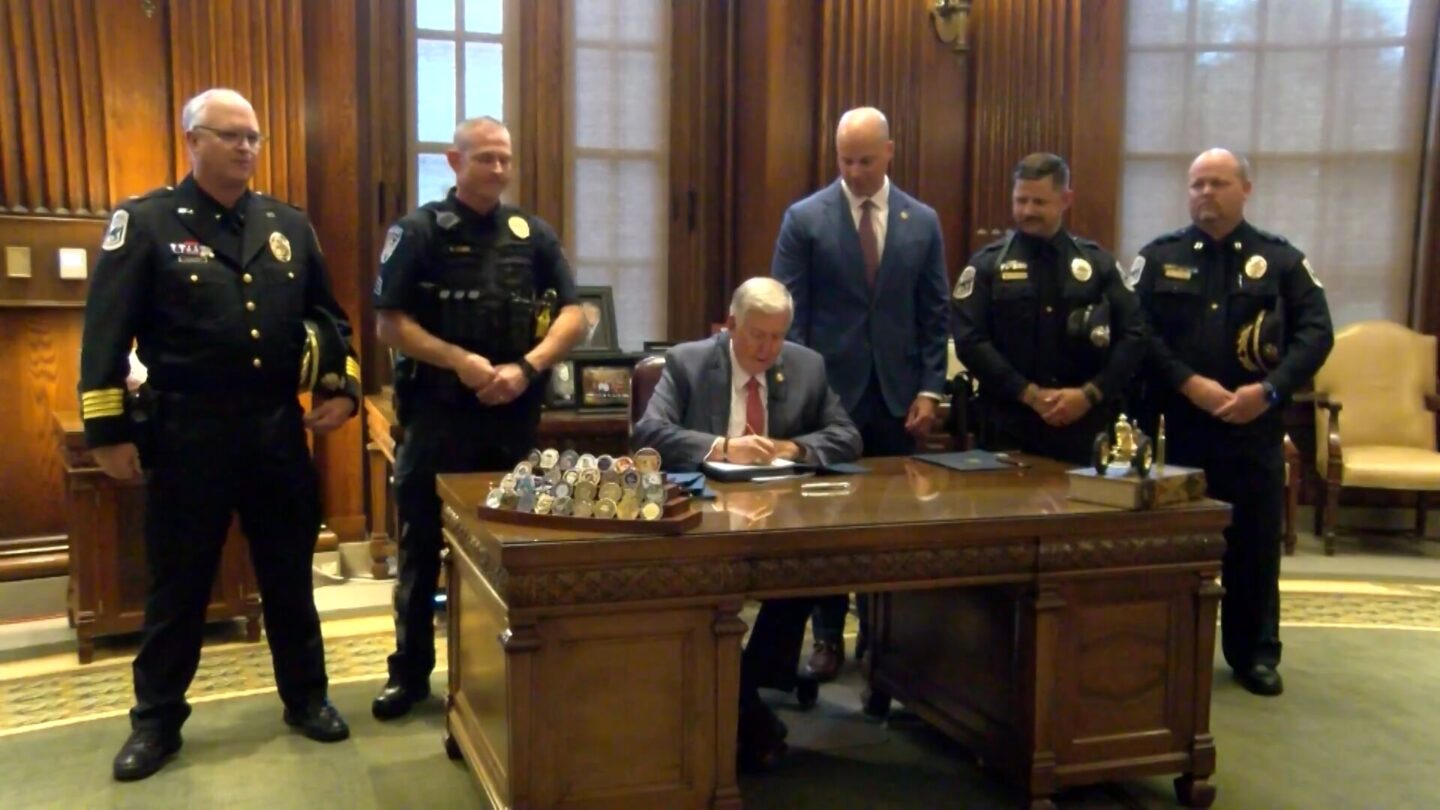Max’s Law goes into effect, strengthening penalties for violence against police dogs

By Kendra Simpson
Last week, an assault on a law enforcement animal was considered property damage. As of Aug. 28, it is punishable by seven years of incarceration and a fine of $10,000 thanks to Max’s Law.
On July 9, Gov. Mike Parson approved legislation enacting Max’s Law, strengthening the penalties for harming or killing a police dog in the line of duty. The law went into effect Aug. 28, but it’s more than a passing of legislation for St. Joseph Police Officer Lucas Winder.
“Sometimes you get that gut feeling that ‘Hey, this could be the one,’” Winder said. “Whether it’s you, your dog, your friends. That’s one of the things, as a police officer, that you prepare yourself for every day. Unfortunately, I had the gut feeling that night that ‘Hey, this could be bad.’”
Winder and his K-9 companion, Max, were called to serve a felony domestic abuse warrant to Valdez William McDonald on June 30, 2021. While attempting to run from the officers, McDonald shot Max. Winder rushed to Kansas City to seek medical care for the dog, but Max succumbed to the gunshot wound before arriving at the Blue Pearl veterinarian clinic.
“Getting him down to the vet was a really hard thing to do,” he said. “Because I was driving by myself and I could hear him in the back and I knew he was struggling and it just, it breaks my heart that, you know, that was our last moments together.”
McDonald pleaded guilty to two charges, including knowingly causing the death of a police animal and armed criminal action. He was sentenced to eight years for armed criminal action, but only four years for the murder of Max.
In light of this, State Sen. Tony Luetkemeyer, (R) Parkville, proposed legislation that increases the penalties for injuring or killing K-9 dogs. For three years, Luetkemeyer and Winder worked to get the bill, known as Max’s Law, into legislation. This week, that effort has finally come to fruition.
“I actually came up to Saint Joseph to present a resolution to K-9 Max’s handler, Officer Lucas Winder,” Luetkemeyer said. “During that conversation he and I were having, he said to me, ‘you know, Missouri has one of the most lax laws when it comes to protecting police canines. Is there anything that we can do in Missouri to better protect these animals, because they put their lives on the line to keep officers like me safe?’ And it was from that conversation that the idea for Max’s Law was actually born.”
Those found guilty of injuring the animal, but not to the point of requiring treatment, will be found guilty of a Class A misdemeanor, punishable by up to one year in jail and/or a fine not to exceed $2,000. Those who seriously injure a police dog will be found guilty of a Class E felony, punishable by up to four years in prison and a fine not to exceed $10,000. Those who kill the dog will be found guilty of a Class D felony, punishable by seven years in prison and a fine of up to $10,000.
“I think that this crime bill will, you know, let people know that we need to be careful with what we’re doing and be cognizant of that,” Winder said. “With Max’s Law, that’s my hope. So I’m hoping that he leaves that legacy of accountability for people.”
“Before Max’s Law went into effect, the killing of law enforcement canines was treated as ordinary property damage,” Luetkemeyer said. “And so people weren’t really held accountable for committing that heinous crime. And what Max’s Law does is it raises the offense to a class D felony, meaning somebody could spend up to seven years in prison for killing a law enforcement canine in the line of duty, and hopefully that’ll have a deterrent effect.”
Winder said that although he doesn’t believe a different dog could possibly live up to Max’s expectations, he would take another K-9 in a heartbeat.
“It’s the best job that I’ve had in my entire adult life, working with a dog and being out there every day and making the community safer with the assistance of a dog,” he said. “Given the circumstances of what Max was to me and what he did for this community, my expectations would be very high, but I would be more than happy to go out and handle a dog again.”
For now, Winder can take solace in knowing Max will help protect the lives of other K-9 dogs.



